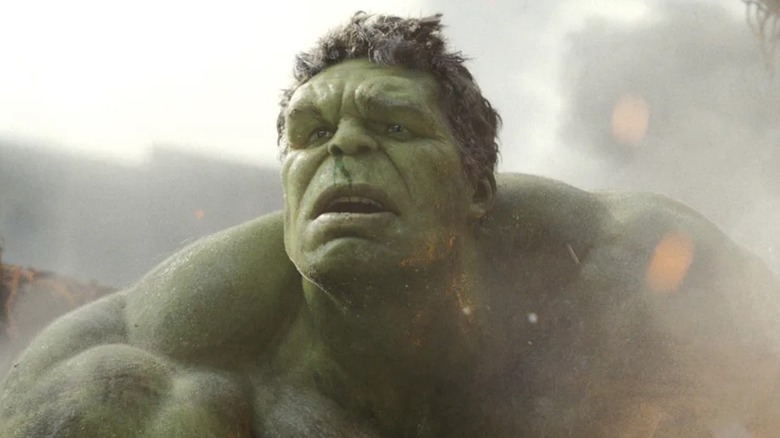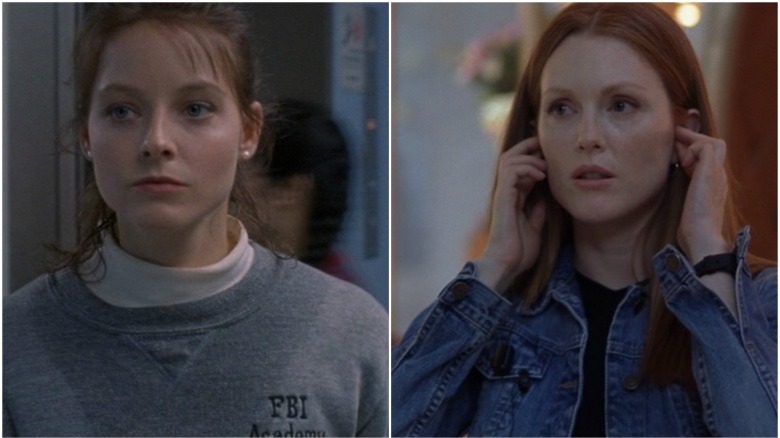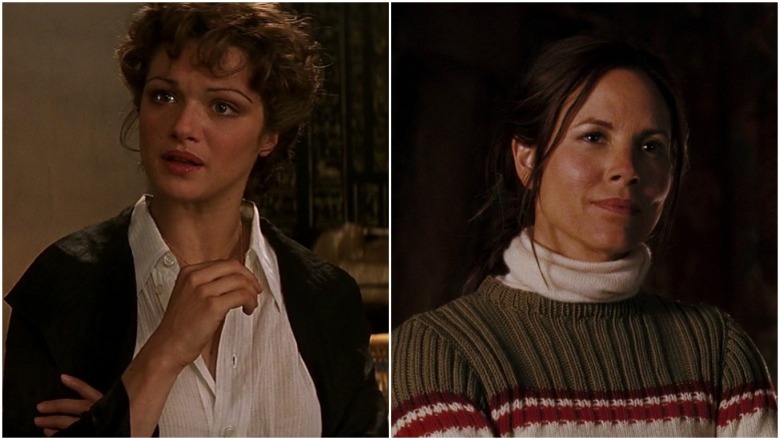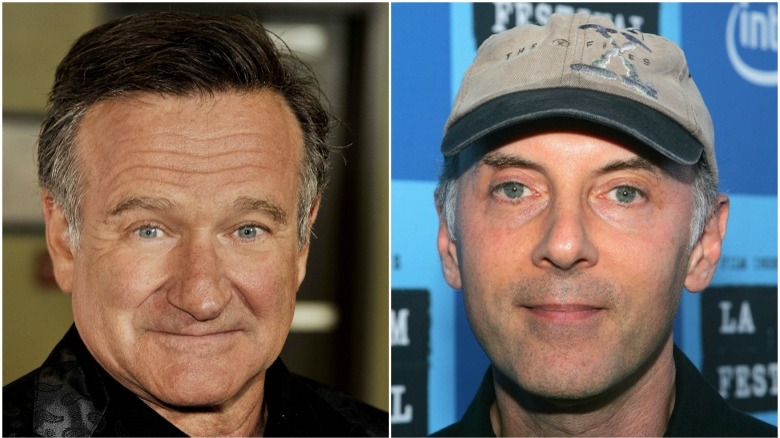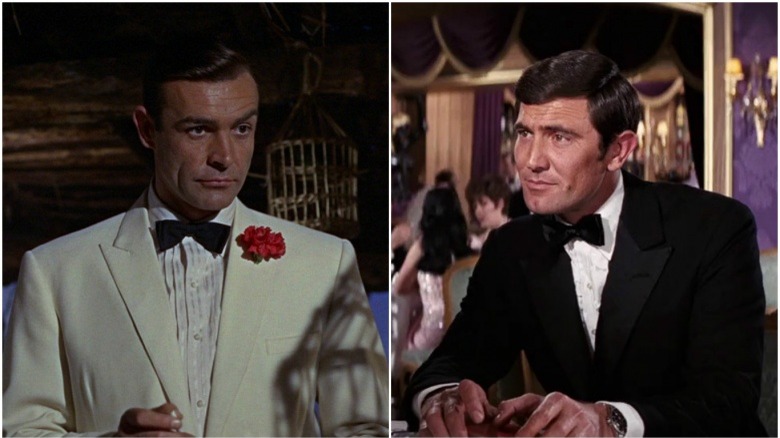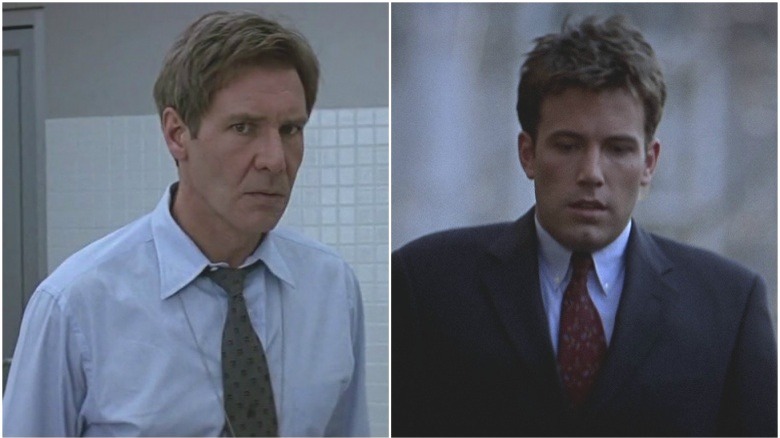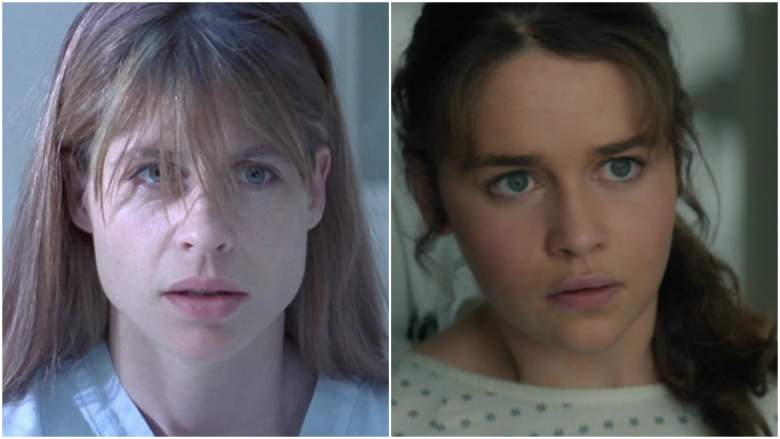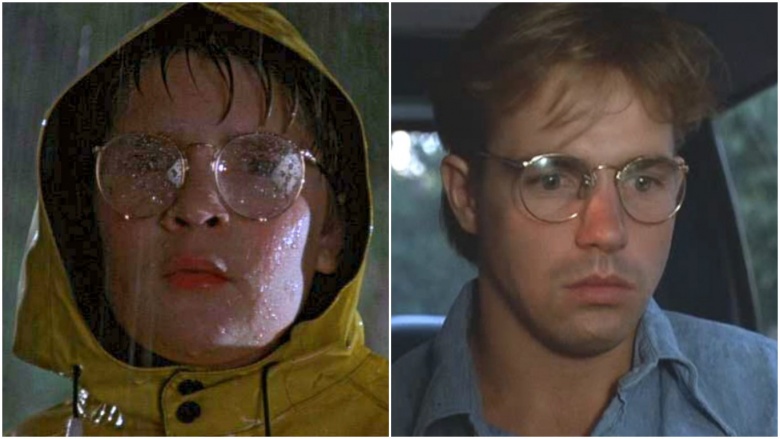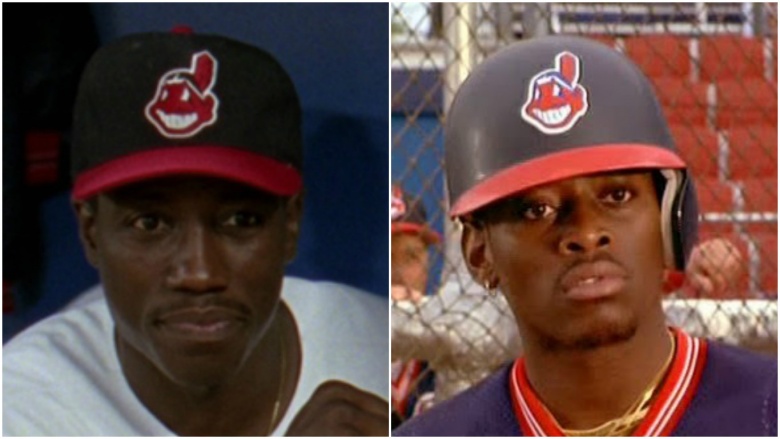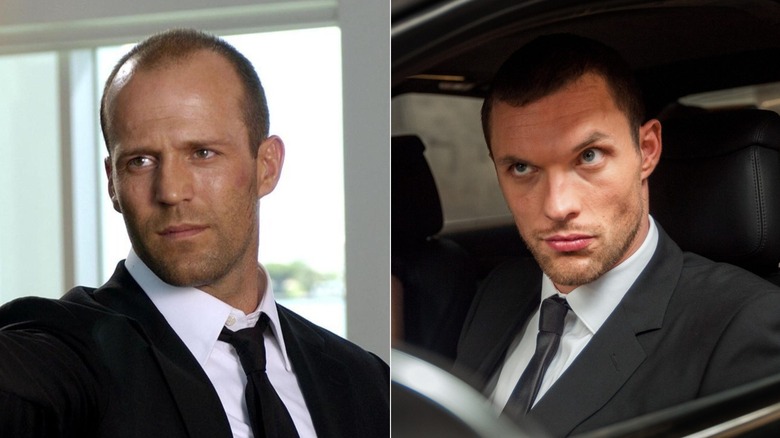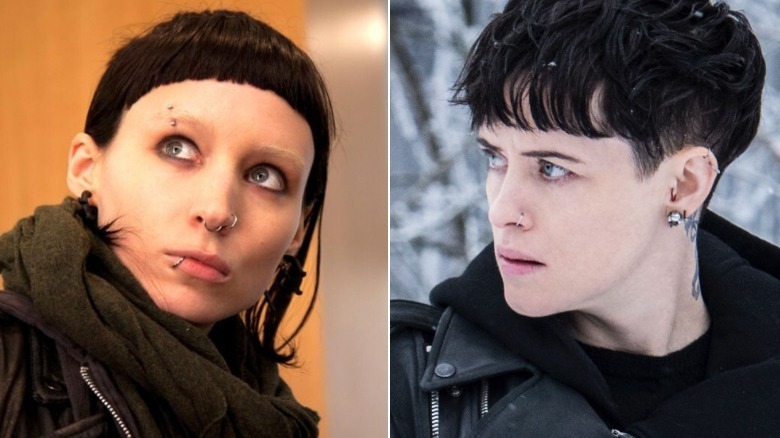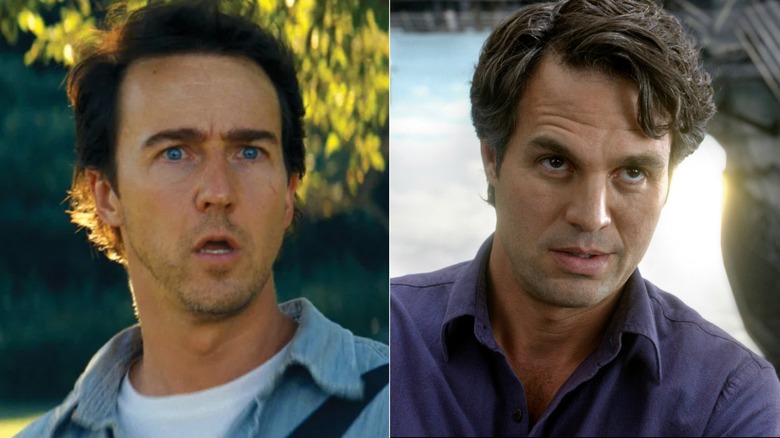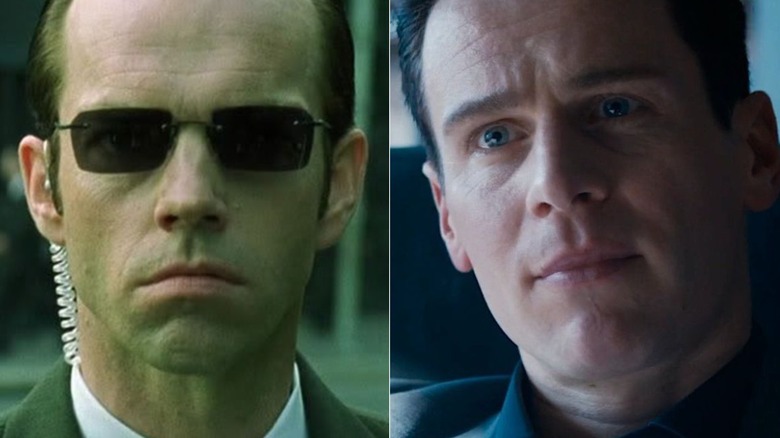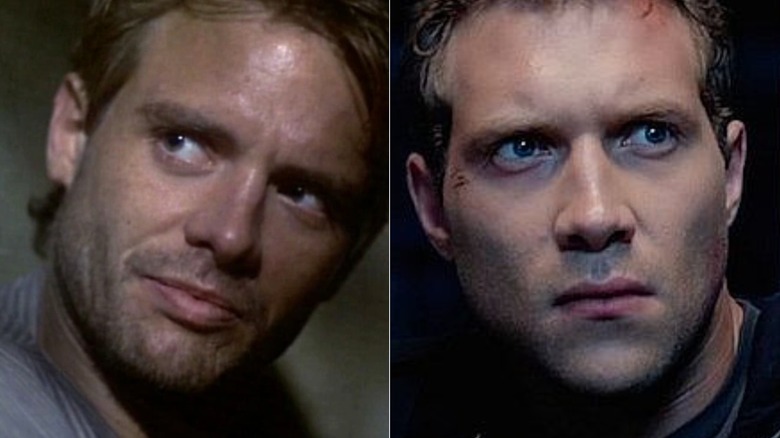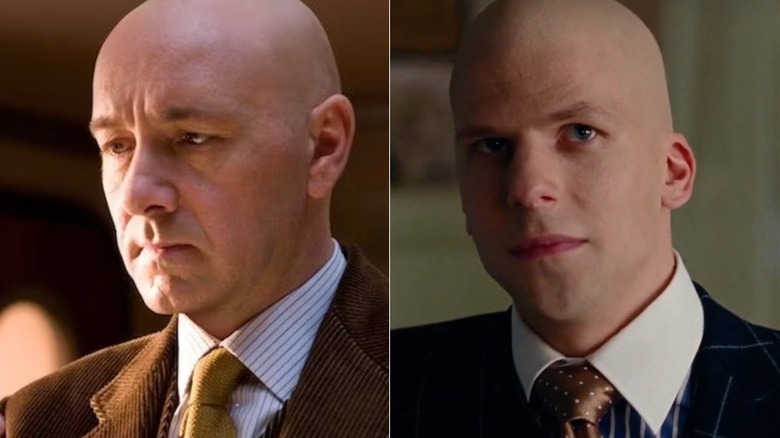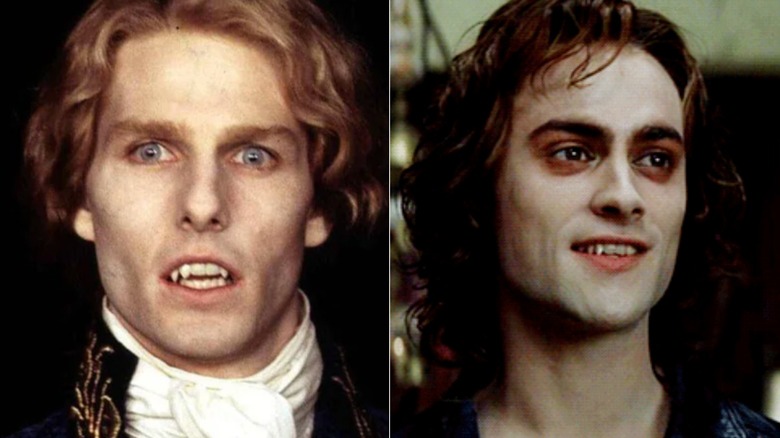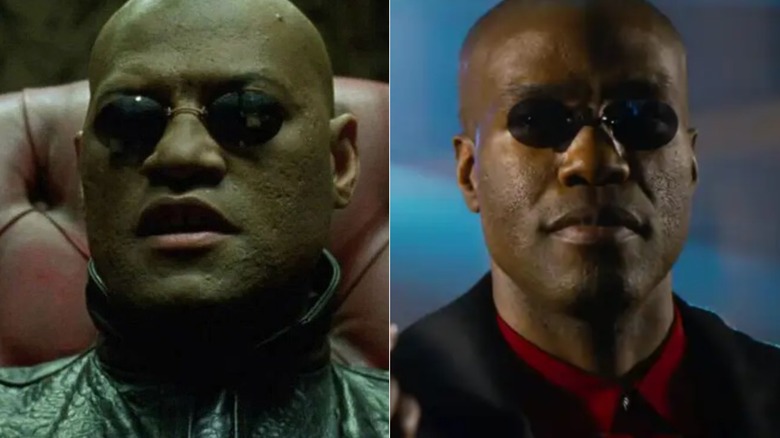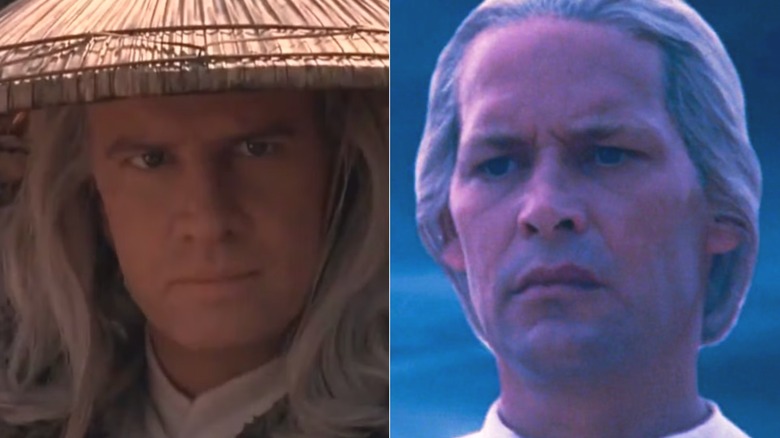Actor Replacements That Ruined The Movie
It's no secret that success at the box office depends on who plays a movie's lead character. After all, can you even imagine anyone else playing Tony Stark besides Robert Downey Jr.? Well, whether or not you can actually do the mental gymnastics required to picture such an eventuality, Marvel Studios might someday want to bring Iron Man back in a movie again, even if he's been dead since "Avengers: Endgame." That's where recasting comes in.
Picking someone to take over a role from another actor is never easy, especially when that original actor drew praise for their take on the character. But recasting is often an unavoidable fact of life, especially for sequels and remakes — creative and/or financial disagreements can get in the way, and age is also a big issue, making things even more delicate when the previous actor has passed away. Producers are well aware that their choices at this early stage can make or break their movie, and in the case of the following films, it most certainly broke them. From wizards and warriors to superheroes and secret agents, these replacements ruined their movies.
Jodie Foster to Julianne Moore (Clarice Starling)
When Ridley Scott signed on to direct the sequel to "The Silence of the Lambs," titled "Hannibal," he did so without his Clarice Starling in place. Anthony Hopkins had already negotiated a cool $11 million to return to the role of Hannibal Lecter, though Jodie Foster evidently didn't share his enthusiasm for a return to the franchise. "The official reason I didn't do 'Hannibal' is I was doing another movie, 'Flora Plum,'" Foster later told Total Film. "So I get to say, in a nice, dignified way, that I wasn't available when that movie was being shot. But Clarice meant so much to ['Lambs' director Jonathan Demme] and I, she really did, and I know it sounds kind of strange to say but there was no way that either of us could really trample on her."
Several big name actresses were considered, with Cate Blanchett and Angelina Jolie both in the frame at one stage, though in the end the part went to Julianne Moore. While both Scott and Hopkins were happy with the choice, audiences were not as convinced. Moore was inevitably compared to Foster and was found wanting, unable to mimic either her predecessor's accent and mannerisms or the strange chemistry that Clarice and Dr. Lecter shared in the previous film. As for Foster? "I saw 'Hannibal,'" she whispered during her Total Film interview. "I won't comment."
Rachel Weisz to Maria Bello (Evelyn O'Connell)
1999's "The Mummy" was a surprise smash for Universal, placing in the top ten highest grossing films of the year after posting global receipts of $415 million. It launched Brendan Fraser's career as a Hollywood action hero and introduced the world at large to a stunning new leading lady in Rachel Weisz, with the pair making a compelling onscreen couple. The duo reprised their roles in 2001's "The Mummy Returns," which, much like the first movie, failed to move critics but made a truckload of money. By the time the third film came around, however, Weisz had concerns about the direction of the franchise.
Despite Universal refuting claims that the third "Mummy" film was in deep trouble, the British actress soon distanced herself from the project on the grounds of the script being "crap," according to a studio source. Maria Bello stepped in to fill the part of Evelyn O'Connell, and the results speak for themselves. With a Rotten Tomatoes score of just 12 percent, 2008's "The Mummy: Tomb of the Dragon Emperor" was widely panned.
Robin Williams to Dan Castellaneta (Genie)
The 1990s was a decade of resurgence and renaissance for Disney. A big part of the Mouse House's surge in popularity was 1992's "Aladdin," its Oscar-winning take on an Arabic folk tale about a "street rat" shedding his rags and winning the heart of a princess. "Aladdin" was packed full of great musical numbers, though the main reason it became such a smash was the input of the late Robin Williams as the Genie. When the actor confirmed that he wouldn't be lending his voice to 1994 sequel "The Return of Jafar" after a battle over Disney's marketing tactics, the search for a new Genie began.
A great voice actor in Dan Castellaneta was ultimately chosen, though for all his talents the "Simpsons" star just couldn't measure up to Williams' frenetic performance. The quality of the animation didn't help matters (it was actually made for TV then got bumped up to a feature to capitalize on the success of the original) but in truth, even if Disney's A-team animators had been on the job, Castellaneta lacked the unpredictability that Williams brought to the Genie, essentially doing a watered-down impression of his predecessor.
Sean Connery to George Lazenby (James Bond)
Roger Moore and Sean Connery are tied with seven appearances apiece as James Bond, though when push comes to shove many 007 fans will tell you that Connery is the only Bond. A poll concluded that 51 percent of Americans chose Connery as their favorite Bond, with Pierce Brosnan coming in a distant second with 12 percent. George Lazenby, the man who replaced Connery in the role for 1969's "On Her Majesty's Secret Service," received just 1 percent of the vote, which tells you everything you need to know about the gulf between these two actors.
While critical opinion towards the film itself has softened over time, Lazenby's performance is still a bone of contention, inevitably compared to those delivered by Connery in the franchise's five previous entries. The Chicago Reader said, "George Lazenby has so much reserve as James Bond that he makes Sean Connery seem almost frenetic by comparison." Reviews in the U.K. were just as critical of the leading man's turn as the British Secret Service agent, with London-based outlet Time Out calling him a "stunning nonentity" fronting a film with "no redeeming features."
Harrison Ford to Ben Affleck (Jack Ryan)
Five films based on Tom Clancy's Jack Ryan exist, yet Harrison Ford is the only actor to play the CIA analyst more than once on the big screen. Eyebrows were raised when Alec Baldwin was given the boot after he successfully debuted as Ryan in 1990's "The Hunt for the Red October," with the actor himself calling the legality of Paramount's behavior into question (via Collider). Baldwin implied that the studio went behind his back and entered into negotiations with Ford, who ended up portraying Ryan in his next two cinematic outings, 1992's "Patriot Games" and 1994's "Clear and Present Danger." Underhanded studio tactics aside, Ford made the role his own, and "Clear and Present Danger" remains the most successful Jack Ryan movie to date.
Eight years would pass before Ryan appeared on screens again, this time portrayed by Ben Affleck. Ford later admitted to the Hollywood Reporter that Clancy was "never terribly happy" with the direction he took the character in, but Clancy was decidedly in the minority, and Affleck's take on the character suffered in comparison. His debut in the role, 2002's "The Sum of All Fears," was met with disdain, with many critics calling his casting into question. Rolling Stone said, "Affleck merely creates an outline for a role he still needs to grow into, a role that Ford effortlessly filled with authority."
Linda Hamilton to Emilia Clarke (Sarah Connor)
Following in the footsteps of Linda Hamilton as Sarah Connor in the "Terminator" franchise was never going to be easy — she gave a performance so layered and compelling that even the most talented of actresses would have struggled to do the character justice. The first to give it a shot was Lena Headey, who was cast as the titular heroine in the short-lived TV series "Terminator: The Sarah Connor Chronicles." Fox canceled the show after two seasons citing cost as the reason, leaving Headey's "Game of Thrones" colleague Emilia Clarke to carry the torch by reprising the character on the big screen for the first time since Hamilton kicked some serious butt in 1991's "Terminator 2: Judgment Day."
2015's "Terminator Genisys" was heavily criticized for using that old time travel chestnut to rewrite the beginning of the "Terminator story" to suit the filmmakers' purposes, though the main problem wasn't the infuriatingly muddled timeline, it was the casting. Veteran film critic Peter Bradshaw dressed down the whole main cast in his one-star review for The Guardian, calling Emilia Clarke's take on Connor "uninteresting."
Harry Hamlin to Sam Worthington (Perseus)
1981's "Clash of the Titans" attempted to give Greek mythology the "Star Wars" treatment, taking the story of Perseus and turning it into a sprawling epic using stop-motion animation and the kind of traditional practical effects that would soon be supplanted by CGI. Director Desmond Davis went with Harry Hamlin in the role of Perseus, a son of Zeus who in legend beheads the Gorgon Medusa in order to save his beloved Princess Andromeda from a giant Kraken. Hamlin remains active in the industry, recently appearing in "Mayfair Witches," though he's still arguably best remembered for his five seasons as the lead on "L.A. Law" and his turn as Perseus.
The same cannot be said for Sam Worthington, best known as the star of James Cameron's massive "Avatar" franchise. Director Louis Leterrier entrusted the Australian with the lead role in his 2010 "Titans" remake, though his choice was called into question when the negative reviews started to pour in. Worthington's earned his share of acclaim over the years, but the "Titans" remake is one release he most likely wouldn't mind leaving off his résumé.
Michelle Pfeiffer to Halle Berry (Catwoman)
Halle Berry taking over from Michelle Pfeiffer in the role of Catwoman is perhaps the most infamous example of recasting going terribly wrong. DC's leather-clad heroine has appeared in numerous "Batman" adaptations over the years, though Pfeiffer's psychotically sexy performance in Tim Burton's "Batman Returns" remains definitive. The actress initially intended to reprise the role in the solo spinoff, though after years in development hell her patience reached its limits and she signed off to concentrate on other commitments.
A number of actresses were touted as her replacement, with Nicole Kidman reportedly considered despite having appeared as Dr Chase Meridian in 1995's "Batman Forever." Ashley Judd was said to have been offered the part but turned it down, calling her decision "the stupidest thing I've done by far" after she learned that Berry had been cast instead. After seeing "Catwoman," she probably took that back. The film was a complete disaster, bombing hard at the box office and cleaning up at the 2005 Golden Raspberry Awards. Berry took her Worst Actress win in good humor, turning up at the ceremony to accept her award in person and thanking the writers, "All 20 of them."
Michael Keaton to Val Kilmer (Batman)
Another error of judgment from the "Batman" universe, this time involving the Dark Knight himself. Michael Keaton handed over the keys for Wayne Manor having portrayed its owner in 1989's "Batman" and its 1992 sequel "Batman Returns," refusing to reprise the role in a third film after reading the screenplay. When pressed for details, Keaton said that he was immensely displeased with the script, pointing the blame for his departure squarely at the writers.
Val Kilmer clearly didn't share Keaton's opinion. The "Tombstone" star accepted the role as-is and went into the film knowing he'd have to contend with a famous cast of villains and a new director. Joel Schumacher shouldered a lot of the blame for 1995's "Batman Forever," though his leading man didn't escape criticism. Kilmer's performance was described as "utterly lethargic" and "god-awful," with Film4 bashing the filmmakers for dispensing with "Michael Keaton's excellent Batman in favor of Val Kilmer, who frankly is not quite up to the job."
Brandon Routh to Henry Cavill (Superman)
Many planned "Superman" projects failed to come to fruition in the years between 1987's resoundingly terrible "Superman IV: The Quest For Peace" and 2006's franchise reboot "Superman Returns." Director Bryan Singer's take on DC's prized property proved to be a solid enough platform to take the franchise forward if nothing else, though the ridiculously large budget meant that it wasn't a financial success. That said, Brandon Routh's turn as the Man of Steel drew praise from many, with Newsweek in particular gushing over Routh for the way in which the newcomer "effortlessly lays claim to the iconic role, just as [Christopher] Reeve did."
Despite a planned sequel, every year that passed without it made it less likely to happen at all, and even though Routh made it clear he wanted to don the red cape again, the studio opted to go with "Man of Steel," a Zack Snyder re-reboot fronted by Henry Cavill. Trouble is, Snyder's film takes the parts of "Superman Returns" that people didn't like — the morose, humorless stretches — and amplifies them. Cavill's downbeat portrayal of the titular hero was described as "so brooding, impregnable and dark" that 2013's "Man of Steel" ended up a film devoid of joy.
Corey Feldman to John Shepherd (Tommy Jarvis)
Despite its name, 1984's "Friday the 13th Part IV: The Final Chapter" was far from the last installment in this long-running horror franchise. In fact, eight more films featuring drowned camper turned serial slasher Jason Voorhees have been made since his so-called final chapter, though the one that directly followed it marked a major dropoff in quality. "Part IV" was acclaimed among certain horror critics for taking time to develop the characters, with Corey Feldman in particular singled out for his fine work as potential killer-in-waiting Tommy Jarvis.
Feldman went on to make a name for himself in "The Goonies," "Stand by Me," and "The Lost Boys," though before he did he reprised his "Friday the 13th" role in 1985's "Part V: A New Beginning." Unfortunately, he only appeared in the prologue, and a time jump meant he was replaced by the painfully dull John Shepherd. Teenage Tommy was static compared to his younger self, though Shepherd shouldn't shoulder the blame entirely. Some blamed the "hamfisted directing" of David Steinmann while others argued that the "Part V" felt like "it was edited with one of Jason's bloody-rusty weapons."
Richard Harris to Michael Gambon (Albus Dumbledore)
While 2004's "Harry Potter and the Prisoner of Azkaban" is a favorite among some fans, the fact remains that it is the lowest grossing movie in the franchise. It did face stiff box office competition from "Shrek 2" that year, but for many the problem with the third film in the series was the new headmaster at Hogwarts. Richard Harris' take on Albus Dumbledore in "Harry Potter and the Sorcerer's Stone" and "Harry Potter and the Chamber of Secrets" remains definitive, despite his replacement Michael Gambon portraying the character in six of the eight installments. Gambon is a seasoned, talented actor, but trying to bring a character from a beloved book to life is never an easy job, especially when another actor has already made an near-perfect job of it.
When Harris died after a battle with Hodgkin's disease, his replacement needed to match the Irishman's wise and calm demeanor, the main characteristics of J.K. Rowling's Dumbledore. Instead of making the transition as seamless as possible, Gambon gave an altogether more aggressive take on the character, typified by a moment in the fourth film in which he frantically grabs Harry in a most un-Dumbledore like rage and berates him about how his name got into the Goblet of Fire. Then again, his take on the character is hardly surprising when you consider that he didn't even bother to read the books.
Ryan Reynolds to Jonathan Bennett (Van Wilder)
"National Lampoon's Van Wilder" isn't going to be preserved in the Library of Congress National Film Registry anytime soon, yet for all its failings, film fans of a certain age remember this movie fondly. This was a time when frat humor was king and sitting down to watch a comedy usually meant turning your brain off for 90 minutes. "Van Wilder" fell squarely into that category, though critics seemed to agree that leading man Ryan Reynolds wasn't the issue here.
After the Kal Penn-led sequel was crucified by critics, the producers decided their next move would be a prequel featuring a younger version of Van, left with little choice after Reynolds refused to return to the role. They brought in Jonathan Bennett for "Van Wilder: Freshman Year," a move described as "a terrible mistake" by DVD Talk. Their review argued that "Reynolds could never be replaced and Bennett is trapped doing an abysmal impression rather than building his own take on the character."
Wesley Snipes to Omar Epps (Major League)
Variety summed up the sequel to the 1989 baseball comedy "Major League" perfectly when they said that the actor who benefited most from it was Wesley Snipes, the man who rejected the opportunity to reprise the role of Willie Mays Hayes in 1994's "Major League II." Snipes had become a movie star in his own right by this point, with critically acclaimed appearances in "White Men Can't Jump" and "Demolition Man" pricing him out of the second outing. With the Cleveland Indians down a man, the filmmakers turned to Omar Epps.
Director David S. Ward had worked with Epps on "The Program" the previous year, another sports movie, this time following the exploits of a college football team. The big difference between the two films was that "The Program" wasn't meant to be funny. Epps didn't have a background in comedy (before "The Program," his only major role was opposite Tupac Shakur in gangland thriller "Juice") and it showed in his timing. Even those that didn't think the film was all that bad admitted that the decision to have Epps take over for Snipes was an unfortunate one.
Jason Statham to Ed Skrein (Frank Martin)
Veteran film critic Mark Kermode summed up 2015's "The Transporter Refueled" with a single question: "What exactly is the point of a 'Transporter' movie without Jason Statham?" When it was revealed that Ed Skrein was to replace Statham as Special Forces op-turned-private driver Frank Martin in the fourth "Transporter" film, questions were raised about the former's ability to carry the franchise forward. "There are these ongoing themes," Skrein said of the scrutiny (via USA Today), adding that it "goes with the territory" when you take on a character originated by another actor.
While the "Transporter" films didn't exactly change the action movie landscape, they benefitted from Statham's presence, athletic prowess and combat skills — he's been training in both kickboxing and Brazilian Jiu Jitsu for years. His replacement lacked that experience, and it showed. Skrein began taking classes in various martial arts disciplines as he prepared for "The Transporter Refueled" and "Deadpool" (he played the villain Ajax in the Ryan Reynolds hit), but even he acknowledged that he was way behind many of his peers in that department. "I'm very respectful and realize I'm not going to be able to do things meant for 10 or 20 years of training," he told the BBC.
The action in "The Transporter Refueled" was ultimately limited by the new star's fledgling abilities. Ed Skrein's one and only outing as Frank Martin was a commercial and critical flop that left the Luc Besson-produced franchise dead in the water.
Rooney Mara to Claire Foy (Lisbeth Salander)
Rooney Mara took on the role of Stieg Larsson's androgynous computer hacker Lisbeth Salander when the first book in the late Swedish author's "Millennium" series got the Hollywood treatment in 2011, starring opposite Daniel Craig in "The Girl with the Dragon Tattoo." When the 2018 sequel "The Girl in the Spider's Web" was announced, fans of David Fincher's critically acclaimed first film were a little disappointed that both Mara and Craig (who played journalist Mikael Blomkvist) had been recast, and so was Mara. "I was hopeful to come back, but they decided to do a different thing," she told Yahoo!. "It was always a character I wanted to revisit, but that's not what happened."
Sverrir Gudnason took on the role of Blomkvist, while Claire Foy stepped into the pale, pierced skin of Salander. Unfortunately, she didn't look comfortable in it. She was receiving acclaim for her turn as the young Queen Elizabeth II in "The Crown" at the time, but Foy couldn't pull off Salander's cold eccentricities with the same aplomb as her predecessor. Critics were by and large unimpressed with her version of the goth hacker, with many questioning why she was chosen for the part. "Much as I admire her, Foy is miscast here," the Observer's Wendy Ide said (via the Guardian), calling her "too empathetic for a role that requires an almost reptilian lack of emotion," while IndieWire's senior film critic David Ehrlich called her both "terrible [and] terribly miscast."
Peter Weller to Robert John Burke (Robocop)
Conceived by writer Edward Neumeier on the set of "Blade Runner," Paul Verhoeven's "RoboCop" would ultimately earn its own place in cyberpunk history alongside Ridley Scott's seminal classic. The first "RoboCop" film stars Peter Weller as the titular cyborg. He roams a dystopian, crime-ridden version of Detroit mercilessly dealing with lawbreakers. Weller reprised the role in "RoboCop 2," but he fell out of love with being RoboCop during the making of the sequel and subsequently turned down the chance to play him again in a third film. Producers needed a replacement, and their hearts were apparently set on a little-known actor called Robert John Burke.
"In God's great earth they thought I was the only actor who could do it, I don't know why," Burke said in a 2015 interview. "I think physically I [looked] like Peter Weller, and I had also had extensive karate training, pantomime training, and body training, and I fit the suit." Unsurprisingly, handing the relatively inexperienced Burke the lead role just because he kind of resembled Weller didn't work out very well. He may have looked like him in the suit, but he's "lacking his forerunner's tongue-in-cheek glint of authoritarian machismo" said the New York Times in its review of "RoboCop 3," which inevitably bombed at the box office. Burke just wasn't as convincing as RoboCop, from his delivery to the way he moved — he appeared to be "a lot less comfortable with the hardware," Empire noted.
Tom Hanks to Todd Waring (Allen Bauer)
1988's "Big" is often cited as Tom Hanks' breakout movie, but he actually announced himself as a potential star some four years earlier in Ron Howard's fantasy rom-com "Splash." Hanks stars as the unlucky-in-love Allen Bauer, a young man who returns to the spot of what he believed was a near-death hallucination to discover that the woman he saw in the water the day he almost drowned is indeed real. Allen falls for mermaid Madison (Daryl Hannah) and ditches life on the land to live under the sea with her in a goofy yet undeniably feel-good ending. It's a beloved movie, though the same cannot be said about the little-seen, made-for-TV sequel, "Splash, Too."
Helmed by writer, director and actor Greg Antonacci (who would later become known for playing mobster types in the likes of "The Sopranos" and "Boardwalk Empire"), the highly forgettable and completely unnecessary "Splash, Too" brought Allen and Madison back to dry land, totally ignoring the fact that the government wanted to lock her up in a lab in the previous instalment. Todd Waring ("American Crime Story") took over as Allen Bauer, but, despite his best efforts, he lacked the everyman charm and comedic timing that Hanks already had in abundance at this stage. "The less said about the actors replacing Tom Hanks and John Candy (Freddie Bauer) the better," Film Fad said in its review of the sequel, adding: "To say it's not very good would be an understatement."
Edward Norton to Mark Ruffalo (Bruce Banner/Hulk)
Few actors perfectly embody their comic book counterparts quite like the Marvel Cinematic Universe's Phase One cast. Robert Downey, Jr. as Iron Man, Chris Evans as Captain America, and Samuel L. Jackson as Nick Fury were certainly inspired, as was Edward Norton as Bruce Banner, aka the Incredible Hulk. Appearing as the angry green giant only in 2008's "The Incredible Hulk," kickstarting the MCU alongside the first "Iron Man," Norton's portrayal of the runaway scientist felt ripped from the original Marvel Comics themselves.
Not only was the actor able to balance Bruce's struggles with mental health and his desire for impossible intimacy, but his Hulk was fierce, powerful, and best embodied the character's own rage. But then Norton exited the MCU, never to return. "My feeling was that I experimented and experienced what I wanted to," Norton told The Hollywood Reporter in 2014. "I really, really enjoyed it. And yet, I looked at the balance of time in life that one spends not only making those sorts of films but then especially putting them out, and the obligations that rightly come with that."
So for 2012's grand team-up feature "The Avengers," Marvel recast with Mark Ruffalo (who looks nothing like Edward Norton). Ruffalo's played the reluctant hero ever since, but unfortunately, his one-note brand of comedy feels too far removed from Norton's intricately complex dive into Bruce Banner's psyche. It seems like the MCU opted for its trademark style over substance.
Crispin Glover to Jeffrey Weissman (George McFly)
Another film that was perfectly cast, "Back to the Future" — ignoring the dated references and outlandish view of the future — has become a timeless classic that continues to delight audiences everywhere. When Marty McFly (Michael J. Fox) travels back to the 1950s and meets his parents, things go haywire. Playing the role of Marty's father George is none other than Crispin Glover in arguably his most iconic role. From cowardly "peeping Tom" to confident ladies' man, George undergoes the most significant transformation in the trilogy, both on and off camera.
In fact, some might not even realize that Glover didn't return for "Back to the Future, Part II," replaced by Jeffrey Weissman wearing Glover-inspired prosthetics. Despite having recast Jennifer Parker in the sequels, the filmmakers opted to hide their new George McFly via prosthetics and clever filmmaking techniques that made it nearly impossible to spot the fake. Originally, it was reported that Glover's exit was due solely to a pay dispute, but the actor set the record straight a number of years later.
In "Part II," the filmmakers spliced footage of Glover's performance from the first film, added new material with Weissman, and killed off George McFly in the "alternate 1985" to keep audiences from discovering the truth. It worked well enough, but upon rewatch it's clear how hard director Robert Zemeckis tried to hide the fact that Glover wasn't involved. No wonder George doesn't appear at all in "Part III."
Katie Holmes to Maggie Gyllenhaal (Rachel Dawes)
Live-action Batmen have a "007"-like history of finding a new love interest in each installment. From Kim Basinger's Vicki Vale in "Batman" to Nicole Kidman's Dr. Chase Meridian in "Batman Forever," the Dark Knight certainly gets around. But in Christopher Nolan's visionary take on the character's origins, a new bat-love was born. In 2005's "Batman Begins," Katie Holmes played Bruce Wayne's (Christian Bale) childhood friend turned love interest Rachel Dawes, who is just as important to the plot as any other supporting character.
Rachel discovers Ra's al Ghul's plot to destroy Gotham, while Bruce dons the mask despite her disapproval of going outside the justice system. Ending the film by saying that they can only be together when Gotham City no longer needs Batman, Holmes exited the sequel in favor of her buddy comedy "Mad Money." Replacing her in "The Dark Knight" was Maggie Gyllenhaal, who felt like a different character entirely. No doubt, her performance is excellent, and she certainly fits Nolan's tone for the sequel, but it's hard to believe that Gyllenhaal's Rachel is the same character as Holmes' version.
Not only is Gyllenhaal's Rachel a bit more cavalier than her "Begins" counterpart, but she doesn't seem as personally invested in Bruce as she did before. Sure, some of that is because of her romance with Harvey Dent (Aaron Eckhart), but it also may be that the actress didn't have the same chemistry with Christian Bale as her predecessor.
Hugo Weaving to Jonathan Groff (Agent Smith)
There's perhaps no greater downgrade in recasting than going from Hugo Weaving to Jonathan Groff as Agent Smith. That's not to say that Groff isn't a talented actor who did the best with what he had to work with (which was admittedly not much), but rather emphasizes the depth of Weaving's original portrayal. Even in the subpar sequels, "The Matrix Reloaded" and "The Matrix Revolutions," Weaving shines brightest, while Ian Bliss tackles an inspired impersonation when the character takes over a human host. But the fourth time was not the charm.
Weaving is a tough act to follow, and thus a new Agent Smith must feel either identical or significantly different from the original in order to make the character work. Unfortunately, Groff's portrayal in "The Matrix Resurrections" is neither. Due to scheduling conflicts, Weaving was unable to return for the fourth installment, leaving the fate of the character up in the air. But the filmmakers decided to keep Smith around, albeit without the character's iconic face.
Rightfully deemed "another piece of IP, an algorithm of unoriginality" by The Guardian, "The Matrix Resurrections" failed to recapture what made the relationship between Neo (Keanu Reeves) and Smith so special, and that's due at least in part to Weaving's absence. "Groff gets his shot at a uniquely hateable performance smothered by intercuts to Smith's original actor," The Verge added, reminding us that Hollywood's biggest sin is its inability to let things die.
Matthew Lillard to Will Forte (Shaggy Rogers)
There was plenty of controversy surrounding the making of the animated "Scoob!," a reboot feature meant to kickstart a new theatrical "Scooby-Doo" franchise. Between unceremoniously canceled sequels and the film's failed attempts to launch a Hanna-Barbera-inspired cinematic universe (because apparently, everything needs one these days), the biggest problem with "Scoob!" was its casting. Despite retaining Frank Welker as the iconic voice of Scooby-Doo, the rest of the Mystery Inc. gang was scrapped for this tale, including Matthew Lillard's Shaggy Rogers.
Lillard gained international acclaim when he played Shaggy in the two live-action "Scooby-Doo" movies in the early 2000s and went on to take over vocal duties from Casey Kasem for subsequent animated movies and television productions. To this day, Lillard still plays Shaggy as faithfully as ever, but he missed out on the 2020 return to the big screen. "Well this sucks," Lillard posted on Twitter after the film's cast was revealed, with Will Forte replacing him as Shaggy. "What a crappy way to find out ... thanks Hollywood."
Of course, Lillard wasn't the only one replaced, nor was he the only one disappointed by the news, but given his 20+ years with the brand, it was tough news to get. Especially when Will Forte's Shaggy just sounded like, well, a higher-pitched Will Forte rather than our favorite ever-snacking cartoon character. Thankfully, after any further "Scoob!" projects were scrapped, Lillard has resumed voicing Shaggy in all other "Scooby-Doo" projects.
Anthony Perkins to Vince Vaughn (Norman Bates)
There are some movies that should just never be remade. We don't need another "Citizen Kane," "Casablanca," or "Vertigo," and likewise we didn't need another "Psycho" either, but given that the original led to a handful of sequels, it isn't surprising that the movie would be remade before the turn of the century. What's worse is that director Gus Van Sant chose to remake the film nearly shot-for-shot, even copying some of Alfred Hitchcock's signature camera movements. It's unsettling to be sure, which maybe was part of the point.
In any case, Anthony Perkins, whose performance in the 1960 original is iconic to this day, couldn't be overshadowed. So, when Vince Vaughn was cast as Norman Bates in the remake, folks were understandably skeptical. Given Vaughn's overall filmography, especially his modern emphasis on comedies, his casting was always a strange choice. "[Vaughn's Norman Bates] isn't odd enough," critic Roger Ebert famously wrote, "Norman's early dialogue often ends in a nervous laugh ... Vaughn's laugh doesn't seem involuntary."
When all is said and done, Vaughn's Norman is still a psycho, but he's a strange and unlayered one at best, not nearly as frightening or horrific as Perkins' original. Sometimes, it's best not to try and reinvent the wheel, and the 1998 "Psycho" is a perfect example of why.
Macaulay Culkin to Mike Weinberg (Kevin McCallister)
Can you believe that there's been six "Home Alone" movies? No doubt, the best are the first two Chris Columbus-directed features that starred Macaulay Culkin as Kevin McCallister, an inventive younger sibling often forgotten by his family. Over the years, the first two have become Christmas classics with the other less-inventive sequels riding the brand's coattails. But though most of the sequels feature a new protagonist in place of young Kevin, the direct-to-video "Home Alone 4" opted to resurrect the original lead, albeit without Culkin's involvement.
The fourth film takes place seemingly a few years after "Lost in New York," with the McCallister family (who have also been recast) in complete disarray. Here, Kevin is played by Mike Weinberg, who isn't nearly as charismatic or lovable as Culkin, though he does look younger. In fact, if the character's name had been changed, you'd have no clue that this was supposed to be the same kid. No doubt, Culkin wasn't brought back because of his age ("Home Alone 4" was released 12 years after the original), but that's no excuse.
"You have to wonder why they bothered," wrote Sue Robinson of RadioTimes, and we have to agree. Not only was "Home Alone 4" destined to be a train wreck after a poor third installment, but trying to capitalize on the McCallister family without any returning faces was nothing short of a nightmare. More than likely, it was all just Kevin's bad dream.
Michael Biehn to Jai Courtney (Kyle Reese)
One thing that "Terminator Genysis" did exceptionally well was recreate the opening sequence from the original James Cameron movie. From the de-aged Arnold Schwarzenegger to the rebuilt sets, the initial 1984 sequence is an exquisite duplication that holds up. Of course, "Genisys" diverges from there, with the biggest change being the lack of Michael Biehn. While Emelia Clarke sort of resembles Linda Hamilton's Sarah Connor, Jai Courtney looks absolutely nothing like the Kyle Reese we're used to.
At least "Terminator Salvation" featured a younger version of the character, one that still embodied who Kyle is as a character. But Courtney, who lacks charisma and acting ability (except in "Suicide Squad," in which he's great), doesn't translate well into "Genisys" at all. Unfortunately, the film was already a mess and a half to begin with, and a planned franchise was quickly canceled after an increasingly negative reception.
Unsurprisingly, Kyle Reese hasn't appeared in a "Terminator" movie again since. After Linda Hamilton returned to the franchise with "Terminator: Dark Fate," which also flopped, the original timeline was seemingly put back together, with Biehn's Reese back in canon. That, however, means the character is back to being dead again, which is a bit of a bummer.
Kevin Spacey to Jesse Eisenberg (Lex Luthor)
Some actors are just born to play exceptional villains, and Kevin Spacey is one of them. Aside from his work on "House of Cards," Spacey is known for being the bad guy in movies like "Seven," "Fred Claus," and "Baby Driver." But possibly his most inspired antagonistic role came in Bryan Singer's "Superman Returns," where he played the greatest criminal mind of our time. Inheriting the role of Lex Luthor from a retired Gene Hackman, Spacey made the would-be land developer his own, emphasizing Luthor's need for revenge on the Man of Steel.
Aside from Michael Rosenbaum on "Smallville," no one has played the role of Lex on screen quite like Spacey. He shines here as a real threat to Superman, despite not having a single superpower. So when Jesse Eisenberg of "Zombieland" fame was cast as Luthor a decade later for Zack Snyder's "Batman v Superman: Dawn of Justice," let's just say it came as a shock. Acting more like an eccentric Batman or Bond villain than Superman's greatest nemesis, many considered Eisenberg's performance to have ruined the film.
Though Eisenberg's Lex was heavily criticized, and arguably a step down from Spacey's, the character returned briefly in both cuts of "Justice League," teasing a larger future in the DC Extended Universe that was never meant to be.
Billy Dee Williams to Tommy Lee Jones (Harvey Dent)
Speaking of DC Comics villains, Billy Dee Williams played a pre-disfigured version of Harvey Dent in Tim Burton's 1989 "Batman." Dent's appearance was no doubt meant to tease the character's on-screen future as Two-Face, which eventually culminated in "Batman Forever." But in that film, it wasn't Williams facing off against the Dark Knight, it was Tommy Lee Jones. We all know that Val Kilmer replaced Michael Keaton as Batman, but many forget that Williams' Dent and Jones' Two-Face are meant to be one and the same.
Of course, there's a clear difference. Race changes aside, Williams' Dent is a charismatic leader, hoping to use his status to change the hearts and minds of voters. On the contrary, Jones' Two-Face isn't much more than a maniacal sidekick to Jim Carrey's over-the-top Riddler, who only makes "Batman Forever" all the more outlandish. While Roger Ebert once deemed "Forever" better than "Batman Returns," the movie's strange tone and misuse of Tommy Lee Jones make it a controversial bat-flick to this day.
In 2021, DC Comics published a comic continuation to "Batman" and "Batman Returns" that follows the Michael Keaton incarnation of the Dark Knight. Written by "Batman" screenwriter Sam Hamm, the series revives Williams' version of Harvey Dent and chronicles the character's troubled turn into Two-Face, thus establishing the events of "Forever" as an alternate timeline. Talk about a delayed return.
Tom Cruise to Stuart Townsend (Lestat)
Long before AMC's recent television series, Tom Cruise brought the vampire Lestat de Lioncourt to life in the iconic film adaptation of Anne Rice's novel "Interview with the Vampire." Cruise's memorable performance opposite Brad Pitt and a young Kirsten Dunst is certainly a highlight of the film, and he masterfully brings the undead creature to life. But did you know there was a sequel? Cruise sadly didn't reprise his vampiric role, which is probably why most haven't heard of it. Instead, Stuart Townsend took over in 2002's "Queen of the Damned."
Also based on an Anne Rice novel, "Queen of the Damned" was a complete and utter failure. Not only did the movie tank at the box office, but Rice wasn't particularly thrilled with it either, and no other movies based on "The Vampire Chronicles" have been released since. While Townsend may have better resembled the character from the novel in terms of physicality, he didn't have the same sort of gravitas that Cruise brought to the role.
"Tom Cruise had the good sense to stay away from reprising his role of Lestat in this film," wrote Gareth Von Kallenbach of Film Threat. "And audiences should demand this film be buried never to see the light of day again." Harsh words, but hey, if you don't make sure a vampire is dead, they'll come back to bite you.
Laurence Fishburne to Yahya Abdul-Mateen II (Morpheus)
Hugo Weaving wasn't the only actor replaced for 2021's "The Matrix Resurrections." Laurence Fishburne played Morpheus in all three installments of the original trilogy as well as the in-canon "The Matrix Online" video game, which chronicled the character's death. Because of his work in "The Matrix," Fishburne has become a Hollywood staple and has even reunited with his former co-star Keanu Reeves on multiple occasions through the "John Wick" series.
But rather than keep Morpheus in the grave, "The Matrix Resurrections" unsurprisingly resurrects the character (it is in the name, after all), now played by Yahya Abdul-Mateen II. Much like Agent Smith's recasting, Abdul-Mateen makes a valiant attempt to bring Morpheus back to life. At least with his interpretation, this Morpheus isn't the original (who, yes, is still dead), but rather a program meant to help Neo (Reeves) achieve his destiny, which makes this red pill a little easier to swallow.
Nevertheless, the lack of Fishburne (who was never even approached to return) no doubt contributed to the critical and commercial failures of "The Matrix Resurrections." Every "Matrix" sequel proves that it's nearly impossible to recapture what made the original great, but at least the first two follow-ups retained most of their original casts.
Claire Danes to Bryce Dallas Howard (Kate Brewster-Connor)
Compared to the first two James Cameron films, it's understandable why most folks dislike "Terminator 3: Rise of the Machines." The movie tries a bit too hard with the jokes and, aside from possibly the hero's journey of John Connor (Nick Stahl), doesn't really break any new ground. Still, one of the strongest parts of "T3" is the budding romance between John and a young Kate Brewster (Claire Danes), who learns all about Skynet, Terminators, and Judgment Day just a day or so before it occurs. So when the movie ends and John and Kate are trapped underground, we're left to wonder, what's next?
Half a decade later, the McG-helmed "Terminator Salvation" was released, replacing Stahl's John Connor with Christian Bale and Danes' Kate Brewster (now Kate Connor) with Bryce Dallas Howard. Compared to Danes, Howard's portrayal is a bit one-note, though to be fair the actress isn't given as much to work with as her predecessor. "Salvation" hardly centers around John Connor, let alone has any time to further develop Kate, so it's no surprise that the future "Jurassic World" star had little to do.
"The way that my character best serviced the film was being kind of an emotional sounding board for John Connor," Howard revealed to CinemaBlend in 2009. "If there are other films, and if I'm a part of them, I would love to be able to do some intense action stuff." Sadly, there wouldn't be.
James Marsden to Tye Sheridan (Scott Summers/Cyclops)
In the original "X-Men" films, team leader Scott Summers, aka Cyclops, was played by James Marsden. Though he was written a bit too much like a jealous boyfriend at times, Marsden did a decent job bringing this Marvel hero to life, especially concerning his dynamic with Hugh Jackman's Wolverine. But by "X-Men: The Last Stand," the actor left alongside director Bryan Singer in favor of "Superman Returns," leading to Cyclops' untimely demise. Thankfully, once Wolverine fixed the timeline, Scott was resurrected following "X-Men: Days of Future Past," giving us hope for his future.
And then he was recast. "X-Men: Apocalypse," the direct sequel to the 1970s storyline of "Days of Future Past" (which itself followed 2011's "X-Men: First Class"), introduced audiences to a younger Scott Summers, one who has yet to grow into the hero embodied by Marsden in the original "X-Men" trilogy. Played by Tye Sheridan, Cyclops is no longer the field leader of the X-Men, nor does he have much agency in a movie that mostly centers on Professor X (James McAvoy), Magneto (Michael Fassbender), and Mystique (Jennifer Lawrence).
Despite Sheridan's struggle to bring Cyclops to life in "Apocalypse" or its sequel, "Dark Phoenix," James Marsden supported his successor, citing the young actor's role in "Mud" as a particular accomplishment. "I think he's a wonderfully talented actor," Marsden told HitFix in 2015. "I think he's a perfect fit [for the role of Cyclops]."
Christopher Lambert to James Remar (Raiden)
It's no secret that the "Mortal Kombat" series has struggled on the big screen. While video games and animated movies have done particularly well over the years, translating such a stylistic world into live-action can prove difficult. So when director Paul W.S. Anderson released his vision in 1995, fans were relatively happy with the results. The film starred Christopher Lambert of "Highlander" fame as Raiden, along with an ensemble cast that did a decent job at bringing these characters to life. Unfortunately, he didn't return in the sequel.
Years later, Lambert revealed that he didn't like the script for "Mortal Kombat: Annihilation," and we can't exactly blame him. Taking over as Raiden was James Remar, who wasn't exactly notable in the role. Although R.L. Shaffer at IGN later admitted that Remar played the part well, he couldn't get past how bad the rest of the movie was: "Hilariously awful matte shots, cheap costumes, obvious sets and some of the worst CG ever put in a mainstream release fill nearly every scene of this movie."
No doubt, "Mortal Kombat: Annihilation" is a train wreck, and though James Remar did his best to make his part memorable, it only reminds us of how terrible the rest of the movie is. Not only that, but it makes us miss Christopher Lambert all the more.
Rachelle Lefevre to Bryce Dallas Howard (Victoria Sutherland)
Poor Bryce Dallas Howard. She's not a bad actress by any means (she kills it in the "Jurassic World" movies), but she often draws the short end of the stick when being cast in a role already defined by another. This was true again of her part in "The Twilight Saga," where she took over the role of Victoria Sutherland from Rachelle Lefevre. Lefevre played the part in the original movie as well as its sequel "New Moon," where she stalks Edward (Robert Patterson) and Bella (Kristen Stewart) after the former killed her lover in the previous film.
Lefevre played the part well and was a genuine threat to our heroes as she battled werewolves and vampires alike. After a small part in the first movie, her expanded role in the second got fans excited for her inevitable return in the third, "Eclipse," but that wasn't to be. After learning that they'd recast her part with Howard, Lefevre told Access Hollywood that she was stunned. "I was fully committed to the 'Twilight' saga," she explained. "I turned down several other film opportunities and, in accordance with my contractual rights, accepted only roles that would involve very short shooting schedules."
Nevertheless, the studio chose to move on without her, which only upset fans. Ironically, Howard was "Twilight" director Catherine Hardwicke's first choice for Victoria, only the actress reportedly thought the part was "too small."
Val Kilmer to George Clooney (Batman)
There's no doubt that the transition from Michael Keaton's Batman to Val Kilmer's version was a downgrade (although that may have been more an issue with director Joel Schumacher than Kilmer himself), but everything about "Batman and Robin" was a trainwreck. For starters, Kilmer decided that "Batman Forever" had been more than enough, so when Schumacher and company went on with the sequel, they had to find a new Batman to take his place.
And that's where George Clooney came in. Nobody would ever argue that Clooney was a bad actor, especially not after "O Brother, Where Art Thou?" or "Syriana," but his work in "Batman and Robin" wasn't exactly his best. Mick LaSalle of the San Francisco Chronicle wrote, "George Clooney is the big zero of the film, and should go down in history as the George Lazenby of the series." He later added that his Dark Knight was one-dimensional and smug. Hard to argue with that.
"The truth of the matter is, I was bad in it," Clooney admitted to Vanity Fair 24 years later. "I'm terrible in it, I'll tell you. Joel Schumacher, who just passed away, directed it, and he'd say, 'Yeah, it didn't work.'" Unfortunately, this revelation didn't stop him from appearing again as Bruce Wayne via a cameo in 2023's "The Flash," a ridiculous gag referencing an even more ridiculous film.
Kimberly J. Brown to Sara Paxton (Marnie Piper)
Disney Channel Original Movies used to be something special, didn't they? While it may just be nostalgia talking, "Halloweentown" was one of the most beloved Disney Channel features to hit our TV screens. In fact, it was so popular with us '90s kids that two sequels — "Halloweentown II: Kalabar's Revenge" and "Halloweentown High" — were made in the years following. But then a darker installment came, following our beloved Marnie Piper into her college years. Only this time, she wasn't played by the lovable Kimberly J. Brown, who was replaced by Sara Paxton.
"Return to Halloweentown" was a bit of a mess. Though the majority of the original cast returned, Paxton was the odd one out, playing an older Marnie whom viewers didn't recognize or relate to. Strangely, some House of Mouse witchcraft must have been afoot, since there are two conflicting accounts of why Brown was recast in the first place. "I wanted to do the fourth one and was fully available for the shoot," Brown told Oct31st.org in 2010. "Disney decided not to use me for the fourth one, [I don't know why]. I was definitely disappointed not to do it."
But producer Sheri Singer had a different story. " It was not something we wanted to do," she told E Online in 2017. "We couldn't make the deal work. That was why and we didn't want to not do it." Whatever actually happened, it ruined "Halloweentown" for many.
Brendan Fraser to Christopher Showerman (George of the Jungle)
Movies sometimes make clever nods to the reason a character might look different after being recast. It could have been a dream, plastic surgery, or some other strange off-screen development. Other times they just admit they couldn't afford the real deal. That was the case with "George of the Jungle 2." In the first movie, George was played by the ever-talented Brendan Fraser, who rocked the role in the 1997 comedy. But come Disney's direct-to-video sequel, Christopher Showerman took over the titular role.
"Me new George," Showerman's George tells the audience in the opening. "Studio too cheap to pay Brendan Fraser." Of course, George isn't the only character recast in the sequel: Julie Benz replaced Leslie Mann as Ursula Stanhope as well. Strangely Thomas Haden Church reprised his role as Lyle Van de Groot from the first film, though even his presence couldn't save this one. If the direct-to-video budget didn't give it away, "George of the Jungle 2" is full of bad CGI, a retread of the first film's plot, and absolutely no Brendan Fraser, which is a pretty big letdown.
In a review from DVDVerdict, Showerman was described as a "non-entity" who only serves as an "imitation of Brendan Fraser's interpretation of George." Unsurprisingly, that's how most of us felt about the movie as a whole.
Keanu Reeves to Jason Patric (the lead in Speed)
Nobody took over Keanu Reeves' role as Officer Jack Traven from "Speed," but "The Lost Boys" legend Jason Patric did take over as the male lead for its sequel, "Speed 2: Cruise Control." Reeves instead chose to pursue other action roles, which eventually led to the likes of "Constantine" and "John Wick." But with Reeves out for the count, with Patric stepping in as Officer Alex Shaw, "Speed 2" could only end in a wreck.
And wreck it did. It shouldn't come as a surprise that "Speed 2" crashed and burned, with many citing Patric's performance and the screenplay as some of the film's biggest issues. "[Patric is] stalwart and athletic, but fundamentally uninteresting," wrote Richard Schickel for Time magazine. Others, including Sandra Bullock — who returned from the first film – wished they could forget about "Cruise Control" entirely, but it's still out there for all to see.
Interestingly, Reeves is open to returning as Jack Traven one day. While promoting "John Wick: Chapter 4," Reeves told Access Hollywood what would get him back for "Speed 3": "A great story and a great script."
The entire live-action Flintstones cast
After the commercial success of the 1994 live-action adaptation of "The Flintstones" — which starred John Goodman as Fred, Rick Moranis as Barney, Elizabeth Perkins as Wilma, and Rosie O'Donnell as Betty — a sequel was certainly on the minds of those at Universal Pictures. So when another live-action "Flintstones," titled "The Flintstones in Viva Rock Vegas," showed up in theaters six years later, nobody was particularly surprised. The first film had been panned by critics, but the second, well, the second was something of a disaster.
For starters, "Viva Rock Vegas" is a prequel rather than a sequel, which recasts its comedic leads with Mark Addy as Fred, Stephen Baldwin as Barney, Kristen Johnson as Wilma, and Jane Krakowski as Betty. To say that any of these actors are untalented on their own would be untrue, but that doesn't mean they were the right folks for the job. "Minute by weary minute the movie wends its weary way toward its joyless conclusion," wrote Roger Ebert when reviewing "Viva Rock Vegas."
While "The Flintstones" was no masterpiece itself, the lack of comedic timing, uninspired jokes, and lackluster cast (at least when compared to the first film) in "Viva Rock Vegas" don't set it up for success. No wonder another live-action "Flintstones" has never been attempted. Maybe they should try again one day with "The Jetsons."
